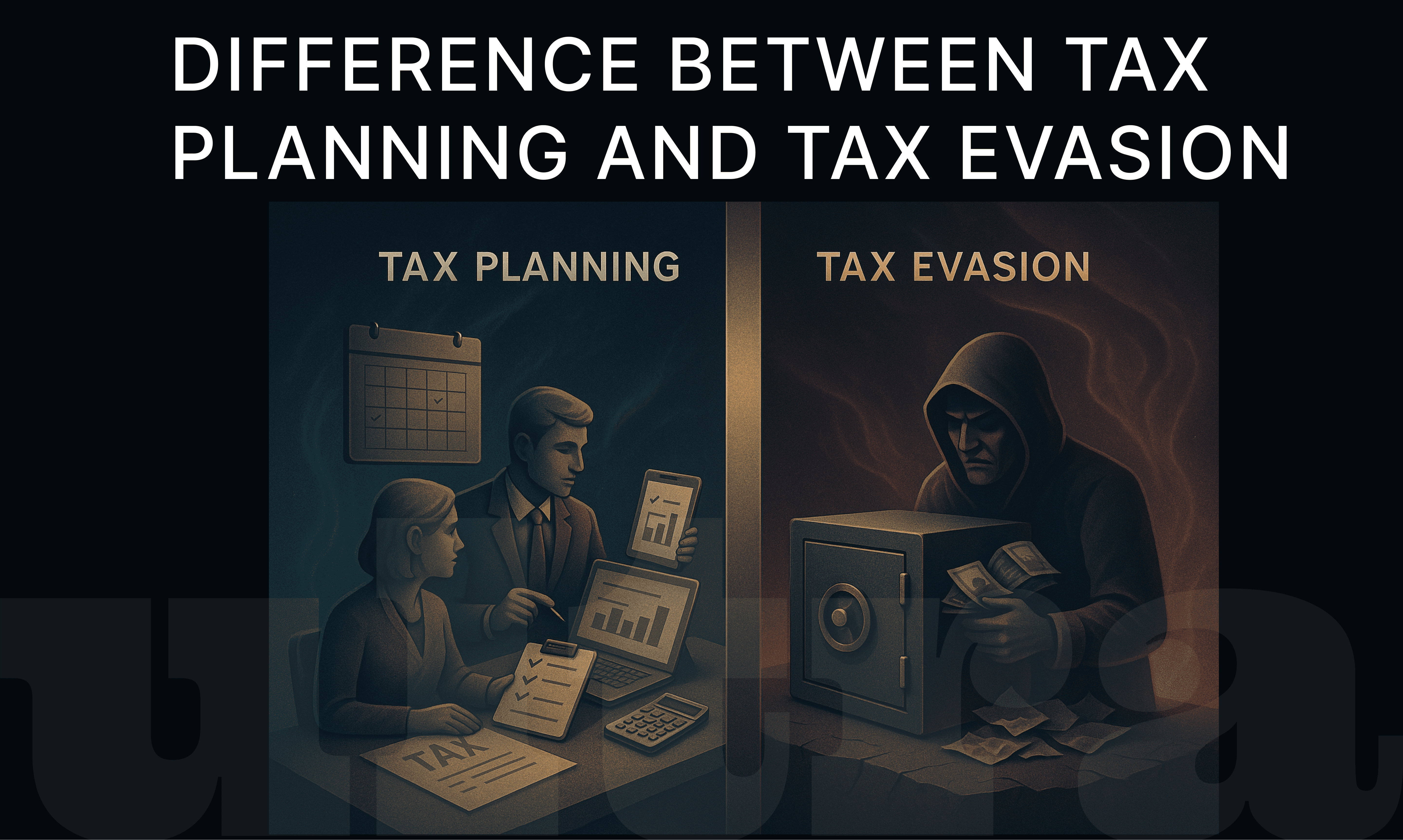Difference Between Tax Planning and Tax Evasion
02 July 2025 · Sachin Gadekar
Understand what is tax planning, tax evasion, and tax avoidance — their meaning, differences, examples, and legal implications.

What is Tax Planning?
Introduction
Tax is an integral part of everyone’s financial life. Whether you are a salaried professional, business owner, or investor, you cannot ignore your tax liabilities. But how you handle your taxes makes a huge difference. Many people often confuse the terms tax planning, tax avoidance, and tax evasion, using them interchangeably. However, there is a clear difference between tax planning and tax evasion.
At Ultra, we help you grow your wealth legally and smartly. This article explains what is tax planning, what is tax evasion, the difference between tax planning, tax avoidance and tax evasion, and why it matters.
Tax Planning?
Tax planning is a legal method of reducing your tax burden by making use of all deductions, exemptions, rebates, and reliefs permitted by law. It means arranging your financial affairs in a way that you pay the minimum legally possible tax.
Examples of Tax Planning:
Investing in tax-saving instruments like ELSS, PPF, and life insurance under Section 80C.
Claiming HRA (House Rent Allowance) if you live in a rented house.
Using deductions for home loan interest under Section 24(b).
Using medical insurance premiums under Section 80D.
Key Points about Tax Planning:
It is completely legal.
It follows the provisions of the Income Tax Act.
It encourages savings and investments.
It ensures optimum use of tax benefits and government schemes.
What is Tax Evasion?
Tax evasion is an illegal act of intentionally avoiding payment of taxes that are lawfully due. It involves fraud, misrepresentation, hiding income, or claiming false deductions to pay less tax.
Examples of Tax Evasion:
Not reporting part of your income.
Showing fake expenses to reduce taxable income.
Accepting large cash payments and not disclosing them.
Creating fake invoices or manipulating accounts.
Key Points about Tax Evasion:
It is illegal and punishable by law.
It includes fraud, concealment and wilful misstatement.
If caught, it leads to penalties, interest, fines, or even imprisonment.
What is Tax Avoidance?
People also confuse tax avoidance with tax planning. Tax avoidance means using loopholes in the tax law to reduce tax liability. It is technically legal but goes against the spirit of the law. Tax authorities can challenge such arrangements if they find them artificial.
Examples of Tax Avoidance
Shifting income to another person in a lower tax bracket.
Creating shell companies to avoid tax.
Routing money through tax havens.
Difference Between Tax Planning and Tax Evasion
| Basis | Tax Planning | Tax Evasion |
|---|---|---|
| Meaning | Legitimate way to minimise tax burden | Illegal act of avoiding payment of tax |
| Legality | Fully legal | Illegal |
| Methods | Using deductions, exemptions, investments | Concealment of income, false expenses |
| Consequences | No penalties, fully allowed | Penalties, prosecution, imprisonment |
| Examples | Investing in PPF, ELSS, insurance | Under-reporting income, fake invoices |
Difference Between Tax Avoidance and Tax Evasion
| Basis | Tax Avoidance | Tax Evasion |
|---|---|---|
| Meaning | Arranging finances to exploit loopholes legally | Illegal non-payment or under-reporting of tax |
| Legality | Legal but unethical | Illegal |
| Method | Using grey areas in tax laws | Fraud and misrepresentation |
| Action by Tax Dept | May be disallowed if proved artificial | Strict penalty and prosecution |
Why Understanding the Difference Matters
For every taxpayer, it is important to understand these differences:
Tax planning is wise and encouraged.
Tax avoidance is a grey area and may be scrutinised.
Tax evasion is a crime and should be avoided at all costs.
Businesses and individuals should aim for smart tax planning while staying away from unethical shortcuts.
How to Do Tax Planning the Right Way
Here are some practical tips:
Invest in approved tax-saving schemes.
Take professional advice from a tax consultant.
Maintain proper records and proofs for deductions.
File your Income Tax Returns on time and honestly.
Stay updated with tax law changes to plan better.
FAQs on Tax Planning vs Tax Evasion
Q1. What is the difference between tax planning and tax evasion?
Tax planning is a legal way of reducing tax liability using lawful deductions and exemptions. Tax evasion is the illegal act of hiding income or showing fake expenses to avoid paying tax.
Q2. Is tax avoidance legal?
Tax avoidance is technically legal but is considered unethical as it uses loopholes to dodge tax. Tax authorities may reject such arrangements if found to be a sham.
Q3. Can you go to jail for tax evasion?
Yes, tax evasion is a criminal offence. If found guilty, you may face fines, penalties and even imprisonment under tax laws.
Q4. How can I plan my taxes better?
Invest in approved tax-saving instruments, use eligible deductions and exemptions, and keep all necessary documents ready while filing ITR.
Q5. What are examples of tax planning?
Investing in ELSS, claiming HRA, availing deductions under Section 80C, 80D, using education loan interest benefits are examples of legal tax planning.
Conclusion
Tax planning is your right and responsibility — use it wisely to save tax legally. Avoid falling into the trap of tax evasion or shady practices which can land you in legal trouble.
At Ultra, we believe in helping you grow your wealth through legal and smart ways. Stay informed, plan your taxes well, and invest smartly.
Visit Ultra for more financial guides and smart investment opportunities.